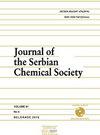从新分离的枯草芽孢杆菌17B菌株中制备聚γ-谷氨酸PGA/TiO2纳米复合材料
IF 1
4区 化学
Q4 CHEMISTRY, MULTIDISCIPLINARY
引用次数: 1
摘要
保利(?-谷氨酸(PGA)是一种可生物降解、无毒、生物相容性和非免疫原性的负电荷聚合物,由芽孢杆菌自然产生。由于它的特性,它在食品、化妆品和制药工业中得到了广泛的应用。本研究从50株芽孢杆菌野生型菌株中筛选出枯草芽孢杆菌17B为最佳PGA产生菌,该菌株具有不依赖谷氨酸的特性。采用Box-Behnken实验设计,对新鉴定菌株的PGA产量进行了优化,并提高了10倍。从发酵液中回收纯化后的PGA纯度经SDS-PAGE和亚甲基蓝染色证实。采用ESI MS对PGA进行了表征,并将其用于制备TiO2纳米复合材料。研究了PGA/TiO2纳米复合材料的合成、结构分析以及对宫颈癌细胞系(HeLa细胞)的细胞毒作用,以确定该材料的潜在抗癌用途。令人鼓舞的是,与单独的TiO2相比,PGA/TiO2纳米复合材料显示出更强的细胞毒作用。本文章由计算机程序翻译,如有差异,请以英文原文为准。
A novel PGA/TiO2 nanocomposite prepared with poly(γ-glutamic acid) from the newly isolated Bacillus subtilis 17B strain
Poly(?-glutamic acid) (PGA), naturally produced by Bacillus species, is a biodegradable, non-toxic, biocompatible, and non-immunogenic negatively charged polymer. Due to its properties, it has found various applications in the food, cosmetic and pharmaceutical industries. In this work, Bacillus subtilis 17B was selected as the best PGA producer among fifty wild-types Bacillus strains tested and characterized as a glutamate-independent producer. The production of PGA by the newly identified strain was optimized and increased tenfold using the Box-Behnken experimental design. The purity of PGA after recovery and purification from the fermentation broth was confirmed by SDS-PAGE followed by Methylene Blue staining. PGA was characterized by ESI MS and used for the preparation of a new nanocomposite with TiO2. The synthesis of PGA/TiO2 nanocomposite, its structural analysis, and cytotoxic effect on the cervical cancer cell line (HeLa cell) was investigated to determine the potential anti-cancer usage of this newly prepared material. Encouraging, PGA/TiO2 nanocomposite showed an increased cytotoxic effect compared to TiO2 alone.
求助全文
通过发布文献求助,成功后即可免费获取论文全文。
去求助
来源期刊
CiteScore
1.80
自引率
0.00%
发文量
76
审稿时长
1 months
期刊介绍:
The Journal of the Serbian Chemical Society -JSCS (formerly Glasnik Hemijskog društva Beograd) publishes articles original papers that have not been published previously, from the fields of fundamental and applied chemistry:
Theoretical Chemistry, Organic Chemistry, Biochemistry and Biotechnology, Food Chemistry, Technology and Engineering, Inorganic Chemistry, Polymers, Analytical Chemistry, Physical Chemistry, Spectroscopy, Electrochemistry, Thermodynamics, Chemical Engineering, Textile Engineering, Materials, Ceramics, Metallurgy, Geochemistry, Environmental Chemistry, History of and Education in Chemistry.

 求助内容:
求助内容: 应助结果提醒方式:
应助结果提醒方式:


